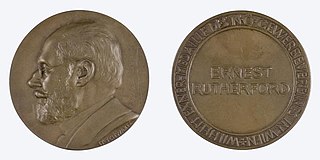Related Research Articles

Klaus von Klitzing is a German physicist, known for discovery of the integer quantum Hall effect, for which he was awarded the 1985 Nobel Prize in Physics.

The Max Planck Institute for Biophysical Chemistry, also known as the Karl-Friedrich Bonhoeffer Institute, was a research institute of the Max Planck Society, located in Göttingen, Germany. On January 1, 2022, the institute merged with the Max Planck Institute for Experimental Medicine in Göttingen to form the Max Planck Institute for Multidisciplinary Sciences.

The German Physical Society is the oldest organisation of physicists. As of 2022, the DPG's worldwide membership is cited as 52,220, making it one of the largest national physics societies in the world. The DPG's membership peaked in 2014 when it reached 63,000, but it has been decreasing since then. It holds an annual conference and multiple spring conferences, which are held at various locations and along topical subjects of given sections of the DPG. The DPG serves the fields of pure and applied physics and aims to foster connections among German physicists, as well as the exchange of ideas between its members and foreign colleagues. The bylaws of the DPG commit the organization and its members to maintain scientific integrity and ethics, including freedom, tolerance, truthfulness, and dignity in scientific work, as well as promoting gender equality in the fields of physics and related sciences.

The Gottfried Wilhelm Leibniz Prize, or Leibniz Prize, is awarded by the German Research Foundation to "exceptional scientists and academics for their outstanding achievements in the field of research". Since 1986, up to ten prizes have been awarded annually to individuals or research groups working at a research institution in Germany or at a German research institution abroad. It is considered the most important research award in Germany.

The Max Born Medal and Prize is a scientific prize awarded yearly by the German Physical Society (DPG) and the British Institute of Physics (IOP) in memory of the German physicist Max Born, who was a German-Jewish physicist, instrumental in the development of quantum mechanics. It was established in 1972, and first awarded in 1973.
The Stern–Gerlach Medal is the most prestigious prize for experimental physicists awarded by the German Physical Society. It is named after the scientists of the Stern–Gerlach experiment, Otto Stern and Walther Gerlach. It was originally called the Stern–Gerlach Prize, and has been awarded annually since 1988. It was converted into a medal in 1992.
The Karl-Scheel-Preis is an award given annually by the Physikalische Gesellschaft zu Berlin, a regional association of the Deutsche Physikalische Gesellschaft, for outstanding scientific work. The prize was established through an endowment by the German physicist Karl Scheel and his wife Melida. Recipients are awarded with the Karl-Scheel Medal and 5.000 Euros. The Karl-Scheel Medal in bronze was designed by the German sculptor Richard Scheibe and has a diameter of 12 cm.
The Handel Prize is an annual award, instituted in 1956, which is presented by the city of Halle, in Germany, in honour of the celebrated Baroque composer George Frideric Handel. It is awarded, "for exceptional artistic, academic or politico-cultural services as far as these are connected with the city of Halle's Handel commemoration". The prize consists of a diploma, a gold and enamel badge, and is presented during the annual Handel Festival, Halle.
Klaus Blaum is a German physicist and director at the Max Planck Institute for Nuclear Physics in Heidelberg, Germany.
Knut W. Urban is a German physicist. He has been the Director of the Institute of Microstructure Research at Forschungszentrum Jülich from 1987 to 2010.
The Erwin Schrödinger Prize is an annual award presented by the Austrian Academy of Sciences for lifetime achievement by Austrians in the fields of mathematics and natural sciences. The prize was established in 1958, and was first awarded to its namesake, Erwin Schrödinger.
The EPS CMD Europhysics Prize is awarded since 1975 by the Condensed Matter Division of the European Physical Society, in recognition of recent work by one or more individuals, for scientific excellence in the area of condensed matter physics. It is one of Europe's most prestigious prizes in the field of condensed matter physics. Several laureates of the EPS CMD Europhysics Prize also received a Nobel Prize in Physics or Chemistry.

The Otto Hahn Prize is awarded biennially jointly by the Society of German Chemists, the German Physical Society and the city of Frankfurt am Main for outstanding achievement in the field of chemistry, physics or applied engineering science. It was established in 2005 by the merger of the previous Otto Hahn Prize for Chemistry and Physics and the Otto Hahn Prize of the City of Frankfurt am Main. The award is presented in the St. Paul's Church, Frankfurt am Main.

The Wilhelm Exner Medal has been awarded by the Austrian Industry Association, Österreichischer Gewerbeverein (ÖGV), for excellence in research and science since 1921.

The German Society for Photography is a German photography organisation, based in Cologne. It is concerned with the application of photography in art, science, education, journalism, economics and politics in cultural contexts.
References
- ↑ "Satzung des Walter-Schottky-Preises für Festkörperforschung" [Statute of the Walter Schottky Prize for solid state research] (in German). German Physical Society . Retrieved October 23, 2012.
- ↑ https://www.dpg-physik.de/auszeichnungen/dpg-preise/walter-schottky-preis/preistraeger